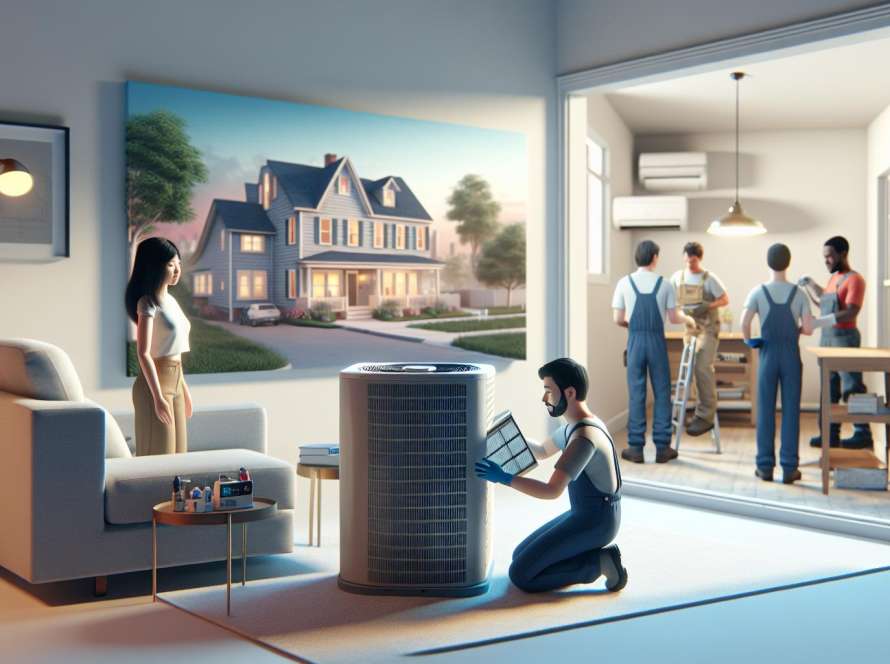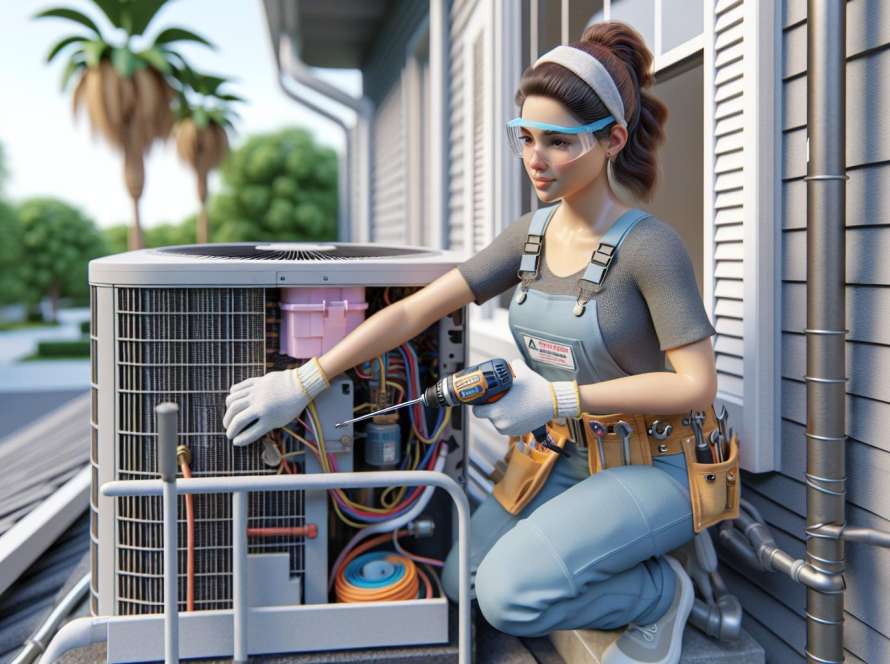So, we’ve all been there – the scorching Florida heat, and suddenly, our AC decides to call it quits. In those moments of panic, knowing some quick emergency fixes can be a lifesaver. Whether it’s a sudden breakdown or just not cooling efficiently, having a few tricks up our sleeves can make all the difference in staying cool and comfortable.
When the Florida sun is relentless, and the last thing we need is a malfunctioning AC unit, being prepared with simple troubleshooting tips can save us from a sweaty situation. From checking the thermostat settings to ensuring proper airflow, we’ll explore some easy DIY solutions to get our AC back up and running in no time. Let’s dive into the world of quick emergency AC fixes, because staying cool in the Florida heat is not just a luxury – it’s a necessity.
Common AC Problems in Florida
Air conditioning systems in Florida are essential for maintaining comfortable indoor temperatures due to the hot climate. However, these systems can face various issues that may disrupt their functioning. Below, we outline common AC problems in Florida and provide solutions tailored to different levels of experience to help you address these issues promptly and effectively.
For Beginners: Recognizing Basic AC Problems
- High Energy Bills: If your energy bills have significantly increased, your AC system might be working inefficiently.
- Weak Airflow: Poor airflow can indicate a clogged filter or ductwork issue.
- Strange Noises: Unusual sounds like banging or hissing could signify a mechanical problem.
For Intermediate Users: Troubleshooting and Maintenance Tips
- Thermostat Issues: Check if the thermostat is set correctly and replace the batteries.
- Refrigerant Leaks: Look for signs of refrigerant leaks like ice buildup on the coils.
- Condensate Drain Clogs: Clear any blockages in the condensate drain line to prevent water backup.
- Evaporator Coil Cleaning: Regularly clean the evaporator coils to maintain optimal cooling efficiency.
- Compressor Problems: Test the compressor for issues like overheating or electrical failures.
- Ductwork Inspections: Inspect ducts for leaks or damage that can affect airflow distribution.
Our comprehensive guide equips you with the knowledge to troubleshoot AC problems at any experience level, ensuring your cooling system operates seamlessly in the Florida heat.
Checking the Thermostat
When it comes to resolving emergency AC issues in Florida, one of the first things to check is the thermostat. It acts as the control center of your cooling system, so ensuring it’s working correctly is essential for optimal performance. Let’s dive into how to troubleshoot thermostat problems based on your level of experience:
For Beginners: Getting Started
- Check the thermostat settings: Make sure the thermostat is set to “cool” mode and the temperature is lower than the current room temperature.
- Replace the batteries: If your thermostat has batteries, consider replacing them, as a simple battery change can sometimes solve connectivity issues.
- Clean around the thermostat: Dust and debris can affect the thermostat’s accuracy, so gently clean around it to ensure proper functioning.
- Reset the thermostat: Sometimes, a simple reset can address minor malfunctions. Turn off the power to your AC system and reset the thermostat to see if it resolves the issue.
For Intermediate Users: Delving Deeper
- Calibrate the thermostat: Use a separate thermometer to compare the temperature readings with those on the thermostat. If there’s a significant difference, recalibrate it.
- Inspect the wiring: Check for any loose or damaged wires connected to the thermostat. Tighten loose connections or consider seeking professional help for wiring issues.
- Upgrade to a smart thermostat: Investing in a smart thermostat can offer more precise temperature control and energy-saving features for improved efficiency.
- Test thermostat functionality: Use a multimeter to test the thermostat for voltage levels and continuity to identify any internal issues.
- Consider zoning systems: Advanced users may explore installing zoning systems that allow different temperature settings in various areas of your home for customized comfort.
- Consult with a professional: If you encounter complex thermostat issues beyond DIY fixes, consulting with an HVAC professional can provide tailored solutions.
Remember, a malfunctioning thermostat can disrupt your AC system’s performance, so addressing any issues promptly is crucial in maintaining a cool and comfortable indoor environment in Florida.
Cleaning or Replacing Air Filters
When it comes to quick emergency AC fixes in Florida, one of the essential steps is Cleaning or Replacing Air Filters. This simple task can have a significant impact on your AC system’s efficiency and performance. To address this issue effectively, we have tailored recommendations for varying experience levels:
For Beginners: Basic Maintenance Tips
- Locate the air filter in your AC system.
- Carefully remove the filter and inspect it for dust, dirt, and debris.
- If the filter looks dirty, gently clean it with a vacuum cleaner or water.
- Allow the filter to dry completely before reinstalling it.
- If the filter is damaged or worn out, consider replacing it with a new one.
- Make a habit of checking and cleaning/replacing your air filter every 1-3 months.
For Intermediate Users: Enhancing Performance
- Upgrade to high-efficiency air filters for improved air quality.
- Consider investing in electrostatic filters for enhanced filtration.
- Ensure proper installation of the air filter in the AC system.
- Check for any leaks or gaps around the filter that could affect its performance.
- Set reminders to inspect and maintain your air filters regularly.
- Conduct regular air quality tests to assess the effectiveness of your air filters.
- Explore smart filter options that can be monitored and controlled remotely.
- Implement air purifiers or UV lights in conjunction with air filters for comprehensive air purification.
- Consider professional duct cleaning to prevent contaminants from entering the AC system.
- Stay updated on the latest advancements in air filtration technology for optimal indoor air quality.
By Cleaning or Replacing Air Filters as part of your emergency AC fixes in Florida, you can ensure better air circulation, improved energy efficiency, and prolonged lifespan of your AC system. Remember, a small maintenance task like this can go a long way in keeping your home cool and comfortable during the hot Florida summers.
Ensuring Proper Airflow
For Beginners: Mastering the Basics
- Locate the Air Vents: Ensure that all air vents in your home are open and unobstructed.
- Check Air Filters Regularly: Regularly check and clean or replace air filters to maintain proper airflow.
- Clear Debris: Keep the area around the outdoor unit clean and free of debris to allow for optimal airflow.
- Professional Inspection: Consider scheduling a professional inspection to identify and address any airflow restrictions.
For Intermediate Users: Enhancing Air Circulation
- Upgrade to High-Efficiency Filters: Consider upgrading to high-efficiency air filters to improve airflow and indoor air quality.
- Conduct Air Quality Tests: Perform air quality tests to assess the effectiveness of your HVAC system in circulating clean air.
- Explore Advanced Filtration Options: Research and explore advanced filtration options to enhance airflow efficiency and reduce allergens.
- Invest in Ductwork Inspection: Invest in professional ductwork inspection and sealing to optimize airflow throughout your home.
- Consider Zoning Systems: Explore the installation of zoning systems to control airflow and temperature in different areas of your home.
- Regular Maintenance: Implement a regular maintenance schedule, including cleaning coils and checking refrigerant levels, to ensure optimal airflow efficiency.
| Key Points | Statistics |
|---|---|
| Regularly cleaning or replacing air filters can increase energy efficiency by up to 15%. | 70% of HVAC system failures are linked to improper airflow and maintenance issues. |
DIY Repair Techniques

For Beginners: Getting Started
- Check Thermostat Settings: Make sure the thermostat is set to cool and the temperature is lower than the current room temperature.
- Inspect Circuit Breakers: Ensure the circuit breaker hasn’t tripped; reset if needed.
- Clean Air Filters: Regularly clean or replace air filters to maintain airflow and efficiency.
- Check Air Vents: Ensure air vents are open and not blocked by furniture or other objects.
For Intermediate Users: Enhancing Repair Skills
- Invest in Programmable Thermostats: Upgrade to programmable thermostats for better temperature control and energy savings.
- Seal Air Leaks: Seal gaps around doors and windows to prevent cool air from escaping and warm air from entering.
- Inspect Insulation: Check insulation in the attic and walls to improve energy efficiency.
- Consider Duct Cleaning: Schedule professional duct cleaning to improve airflow and indoor air quality.
- Inspect Evaporator Coils: Regularly clean and maintain evaporator coils to ensure optimal cooling performance.
- Monitor Refrigerant Levels: Keep an eye on refrigerant levels and schedule professional inspection if levels are low.
- Check Condensate Lines: Inspect and clear condensate lines to prevent clogs and water damage.
- Evaluate Overall System Performance: Consider a comprehensive inspection by HVAC professionals to address any underlying issues.
We have provided a structured guide for various skill levels to help you address common AC issues swiftly and efficiently.
Conclusion
We’ve covered a range of DIY repair techniques for addressing common AC issues in Florida quickly and effectively. By following the tips provided, you can troubleshoot your AC system with confidence and potentially avoid costly repairs. Remember to prioritize regular maintenance and keep an eye on your system’s performance to ensure it runs smoothly throughout the year. With these strategies in your toolkit, you’ll be better equipped to handle any emergency AC situations that may arise, keeping your home cool and comfortable in the Florida heat. Stay proactive and informed, and your AC unit will thank you with reliable performance when you need it most.

